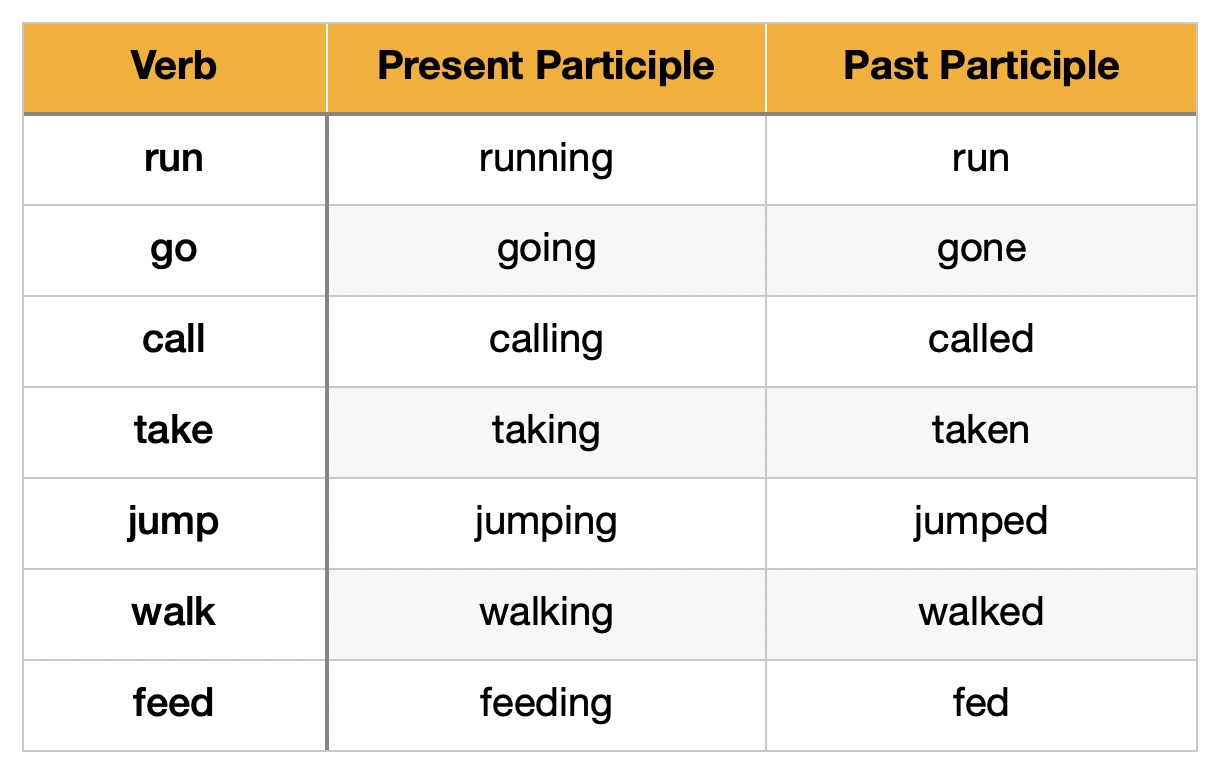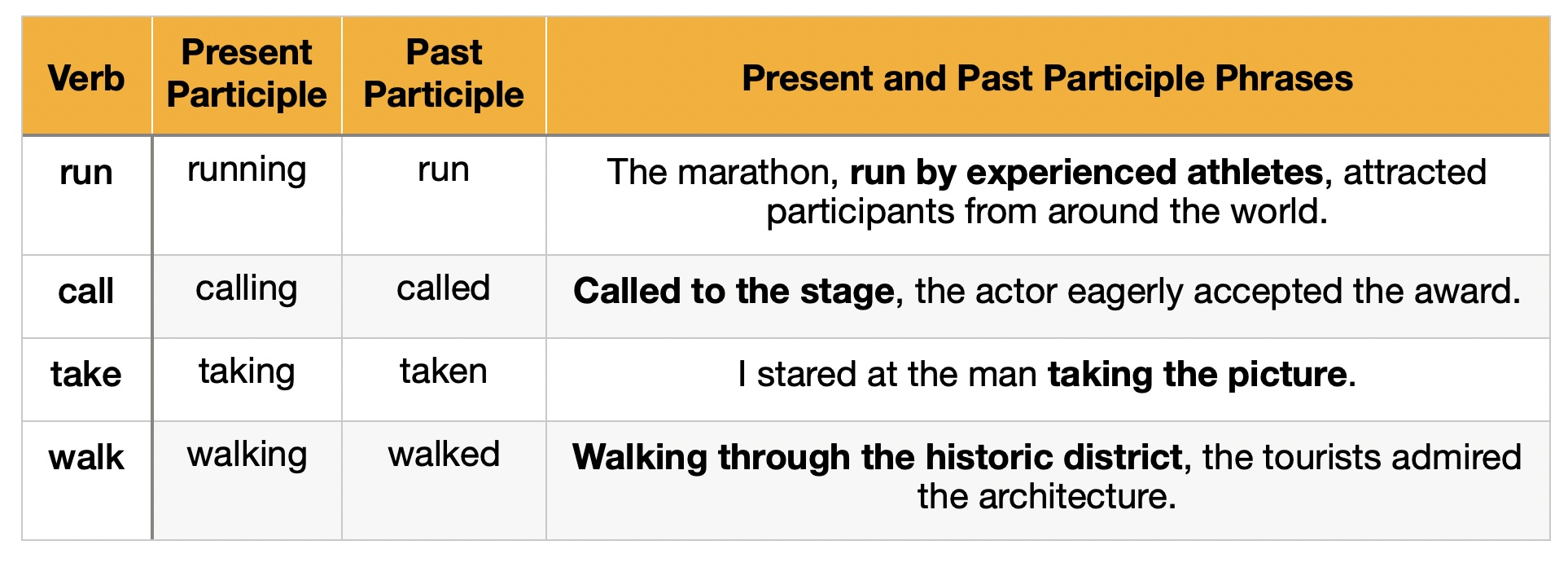- Home
- Phrases & Clauses
- Present and Past Participle Phrases
Present and Past Participle Phrases Explained
Both present and past participle phrases function as adjectives, providing more information about a noun or pronoun in a sentence.
The phrases start with either a present participle or past participle.
What are Participles?
Participles are a significant part of English grammar. They are verb forms which function as adjectives, modifying nouns and pronouns. They fall into two main categories: the Present Participle and the Past Participle.
Present participles end in -ing and past participles have a variety of endings, e.g. -ed, -en, -t, -n etc. Here are some examples:
Examples of Present & Past Participles

So how do these participles become phrases?
Present and Past Participle Phrases
With present and past participle phrases, we are adding further information after the participle, thus making it a phrase.
Here are some examples using some of the previous participles.

You should see that the phrases do not have subjects or finite verbs, hence why they are phrases and not clauses.
Present Participle Phrases
Present Participle Phrases are groups of words that begin with a present participle and modify nouns or pronouns.
They can appear after or before a noun, and anywhere in a sentence. In the sentences below, the participle phrase is in red and the modified noun in blue.
Present Participle Phrase Examples
- The student solving complex equations quickly impressed the mathematics professor.
- The hikers traversing steep mountain trails reached the summit with a sense of accomplishment.
- He was laughing at the dog chasing its own tail.
- I was happy to see the runner completing the marathon in record time.
It's also common to place them at the front of the noun, in which case they are called fronted present participle phrases:
Fronted Present Participle Phrases
- Walking home after school, John noticed the sky becoming darker.
- Sneaking quietly into the room, she surprised her friend with a birthday gift.
- Feeling hot and sticky, I decided to take a refreshing cold shower.
- Attempting to reach the steep summit, the adventurous hiker pressed on.
- Listening to the peaceful sound of the waves, she found herself relaxing.
They are still giving more information about the noun (i.e. the subject in these cases) even though they appear before it. For instance in the first one, John (the subject) was doing the action: walking home after school.
Past Participle Phrases
Past Participle Phrases start with a past participle and also function as adjectives. Here are five examples, which can be placed after the noun or as fronted past participle phrases, where the phrase (in red) is modifying the subject (in blue).
Past Participle Phrases
- Jane, taken aback by the sudden announcement, sat in stunned silence.
- The students, puzzled by the complex equation, turned to their teacher for help.
- Mike, touched by the kindness of strangers, began to see hope in humanity.
Fronted Past Participle Phrases
- Taken aback by the sudden announcement, Jane sat in stunned silence.
- Puzzled by the complex equation, the students turned to their teacher for help.
- Touched by the kindness of strangers, Mike began to see hope in humanity.
- Brought up in a well-disciplined family, she learned to respect her elders at a young age.
- Inspired by the motivational speaker, the audience left the event feeling empowered.
A key distinction between past and present participle phrases is that with the former, they are written in the past tense, indicating that the action in the phrase has happened before the rest of the sentence.
We can see the order (1, 2) by looking at two of the above sentences:
- Puzzled by the complex equation
- The students turned to their teacher for help
- Touched by the kindness of strangers
- Mike began to see hope in humanity
Reduced Relative Clauses
Past and present participle phrases are often actually reduced relative clauses.
Relative Clauses:
- The students, who were puzzled by the complex equation, turned to their teacher for help.
- I stared at the man who was taking the photo
Converted to Participle Phrases:
- The students, puzzled by the complex equation, turned to their teacher for help.
- I stared at the man taking the photo
There are various rules on how to do this, so check out the lesson on reduced relative clauses to learn more.
Common Errors with Participle Phrases
Punctuation
Punctuation with participle phrases varies depending on their placement within a sentence.
Commas
- When they are at the beginning of a sentence (fronted participle phrases), we use a comma after them as they apply to the subject immediately following.
Shaken by the traumatic news, the woman could hardly stand.
- If they are after the noun in the middle/end of a sentence and they are giving non-essential information, commas are placed around them.
The photographs, taken by a professional photographer, captured the essence of the event.
The children spent the afternoon in the park, laughing and playing games with their friends.
No Commas
- If they are after the noun in the middle/end of a sentence and they are giving essential information, no comma is needed.
I was really attracted to the woman wearing the blue dress.
The pupil achieving the highest score will receive a prize.
If you are unsure of the difference between essential and non-essential information, check out this lesson on defining and non-defining relative clauses, as the same principles are being followed.
Dangling Modifiers
A common error when using participle phrases is the dreaded dangling modifier. This happens when you start a sentence with a participle phrase, intending for it to modify a certain subject, but then the subject is not in the sentence at all, confusing the reader.
Examples of Dangling Modifiers
- Running for the bus, my bag fell open.
- Exhausted from the long journey, the hotel room was a welcome sight.
Here, 'my bag' wasn't doing the running, so the phrase is dangling. The past participle phrase "Exhausted from the long journey" is intended to modify the person arriving, but it incorrectly appears to modify the hotel room, resulting in a dangling modifier.
They could be corrected by adding in a subject that is being modified by the present and past participle phrases:
- Running for the bus, I tripped over and my bag fell open.
- Exhausted from the long journey, they found the hotel room was a welcome sight.
Misplaced Modifiers
With misplaced modifiers, the noun being modified is in the sentence, but the participle phrase is not in the correct position to clearly modify that noun.
Examples of Misplaced Modifiers
- Burnt to a crisp, I couldn't eat the pizza.
- Writing in a hurry, the essay was filled with errors by the student.
This sentence could be read to suggest that 'I' have been 'burnt to a crisp', rather than the pizza. In the second one, the essay was not writing.
Correct placement or re-organisation would be:
- Burnt to a crisp, the pizza couldn't be eaten / I couldn't eat the pizza, which was burnt to a crisp.
- Writing in a hurry, the student filled the essay with errors.
Summing Up
Using present and past participle phrases correctly and understanding "participles" and "adjectives", can significantly improve your English grammar, allowing you to express a more extensive range of sentiments and render your writing richer and more nuanced.
Now test yourself on what you've learned in this present and past participle phrases exercise.
New! Comments
Any questions or comments about the grammar discussed on this page?
Post your comment here.









